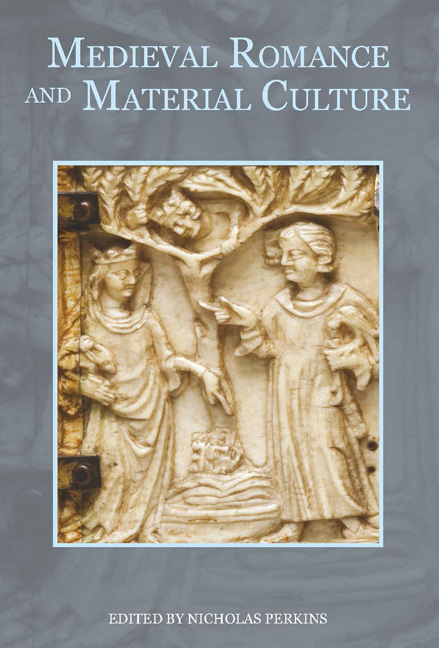Book contents
- Frontmatter
- Contents
- List of Illustrations
- List of Contributors
- Acknowledgements
- Abbreviations
- 1 Introduction: The Materiality of Medieval Romance and The Erle of Tolous
- 2 Courtly Culture and Emotional Intelligence in the Romance of Horn
- 3 Emplaced Reading, or Towards a Spatial Hermeneutic for Medieval Romance
- 4 Devotional Objects, Saracen Spaces and Miracles in Two Matter of France Romances
- 5 The Werewolf of Wicklow: Shapeshifting and Colonial Identity in the Lai de Melion
- 6 ‘Ladyes war at thare avowing’: The Female Gaze in Late-Medieval Scottish Romance
- 7 The Evolution of Cooperation in The Avowyng of Arthur
- 8 Ritual, Revenge and the Politics of Chess in Medieval Romance
- 9 Adventures in the Bob-and-Wheel Tradition: Narratives and Manuscripts
- 10 Reading King Robert of Sicily's Text(s) and Manuscript Context(s)
- 11 The Circulation of Romances from England in Late-Medieval Ireland
- 12 The Image of the Knightly Harper: Symbolism and Resonance
- 13 Carving the Folie Tristan: Ivory Caskets as Material Evidence of Textual History
- 14 Romancing the Orient: The Roman d'Alexandre and Marco Polo's Livre du grand Khan in Oxford, Bodleian Library MS Bodl. 264
- 15 The Victorian Afterlife of The Thornton Romances
- Index
2 - Courtly Culture and Emotional Intelligence in the Romance of Horn
Published online by Cambridge University Press: 05 May 2015
- Frontmatter
- Contents
- List of Illustrations
- List of Contributors
- Acknowledgements
- Abbreviations
- 1 Introduction: The Materiality of Medieval Romance and The Erle of Tolous
- 2 Courtly Culture and Emotional Intelligence in the Romance of Horn
- 3 Emplaced Reading, or Towards a Spatial Hermeneutic for Medieval Romance
- 4 Devotional Objects, Saracen Spaces and Miracles in Two Matter of France Romances
- 5 The Werewolf of Wicklow: Shapeshifting and Colonial Identity in the Lai de Melion
- 6 ‘Ladyes war at thare avowing’: The Female Gaze in Late-Medieval Scottish Romance
- 7 The Evolution of Cooperation in The Avowyng of Arthur
- 8 Ritual, Revenge and the Politics of Chess in Medieval Romance
- 9 Adventures in the Bob-and-Wheel Tradition: Narratives and Manuscripts
- 10 Reading King Robert of Sicily's Text(s) and Manuscript Context(s)
- 11 The Circulation of Romances from England in Late-Medieval Ireland
- 12 The Image of the Knightly Harper: Symbolism and Resonance
- 13 Carving the Folie Tristan: Ivory Caskets as Material Evidence of Textual History
- 14 Romancing the Orient: The Roman d'Alexandre and Marco Polo's Livre du grand Khan in Oxford, Bodleian Library MS Bodl. 264
- 15 The Victorian Afterlife of The Thornton Romances
- Index
Summary
The Romance of Horn is widely admired as one of the most impressive Insular romances of the twelfth century, ‘a neglected masterpiece’, ‘an astonishing and unprecedented—and perhaps unmatched—achievement’. Despite its quality and importance, however, it has received comparatively little close attention. It is recognized as an important piece of evidence for our understanding of the wider political and cultural context within which Anglo-Norman romances were written—as in Laura Ashe's important chapter— and appears regularly in discussions of the Horn story across two vernaculars and three centuries. But remarkably few studies have given attention to the detailed fabric of Thomas's narrative and the focus on those areas it shares with the English language versions neglects its greatest strengths. Unlike the Middle English versions of the Horn story, the Romance of Horn is a lengthy work of some 5,200 lines, written in the long line laisse of French epic poetry. The leisured narrative is indicative of its courtly provenance and provides opportunity for generous elaboration of action and place unavailable in the briefer, sharper, English language versions. This paper looks specifically at the areas of the poem where Thomas has provided rich details of courtly life, its material culture, and, it will be argued, its range of emotional behaviour.
Dated fairly confidently to around 1170, and credibly placed in the Dublin celebrations of Henry II's visit to the Anglo-Norman colony in Ireland in 1171–2, its context is further confirmed by the courtly nature of the romance itself. Long, richly detailed and self-consciously crafted by a named poet, Thomas, it demonstrates knowledge of fashionable contemporary literature— the chansons de geste, the romans antiques, Wace, the Tristan story. There are other aspects of its courtly nature which are important if not so immediately evident: a certain type of insider humour, a realistic rather than deferential attitude to courtly life and behaviour, an ability to analyse and at times criticize the society and social mores it describes.
- Type
- Chapter
- Information
- Medieval Romance and Material Culture , pp. 23 - 40Publisher: Boydell & BrewerPrint publication year: 2015



